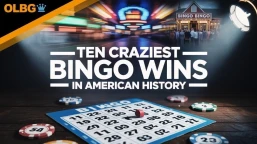
With 30+ years in racing and betting, Darren helps punters develop their skills. As OLBG’s Tipster boss and expert guide, he turns insight into winning strategy.
Everyone who bets would love to win every time, finding winners is the aim everytime.
Since I don't think there is anyone who manages this, then surely everyone's answer to the question “do you lose too often?”, is yes.

That said, some people must be fairly happy with how often they lose.
Imagine a punter called Andy who only ever strikes bets at even money,
Andy wins 60% of the time.
He must be happy because if he strikes 100 bets at 1 unit each, he would expect to lose forty of them and win sixty, giving him a return of 120 units.
He know's that in the long run, he is going to win enough bets to make a profit.
Even with the losses from his losing bets taken into account, he wins.
Andy probably doesn't enjoy the losers, but he might come to accept them and to see them as an occupational hazard.
Now imagine a different punter we will call him Ben, and he wins 80% of his bets.
When this is all the information we have about him, we might think that Ben would be happier than Andy, but if told that Ben only strikes bets at 2/5 then we would have to reconsider.
If Ben strikes 100 bets at a unit a time, he would expect to lose twenty and win 80, but the overall return on these 80 wins would be 112, so Ben would do less well than Andy, even though he wins more often.
You can see that a higher strike rate (80%) does not return you more, because of the odds.
| Punter | Bets | Odds | Strike Rate | Return |
|---|---|---|---|---|
| Andy | 100 | 1/2 (2.0) | 60% | 120 Units |
| Ben | 100 | 2/5 (1.4) | 80% | 112 Units |
Strike Rates and Betting Odds
This example shows us that it is no good knowing how often we are going to win our bets, if we don't know the odds we get.

When we look at how many bets we win as a percentage, we need to consider the odds of the bets, to decide whether or not this percentage is enough.
In the case of both of the bettors mentioned so far, they would both expect to win money in the long run.
They are both making value bets, because the % chance of winning their bets would imply fair odds that are less than the actual odds they are getting.
If you are not making value bets, then it is not going to be possible for you to make money in the long run unless you get lucky.
For Andy, the fair odds that he should get on his bets is 1.67 in decimal odds, but he is actually getting 2.0.
For Ben the fair odds would be 1.25 and he is getting 1.4.
Fair Betting Odds
If both bettors were betting at fair odds then they would be expected in the long run to break even.

Because the odds they are getting pay them more money than the fair odds, then, in the long run, they can expect to make money.
At this point, I should perhaps explain what I mean by the word “expect”.
Of course, if either of the bettors were to make one bet at the fair odds then there is zero chance that they would break even.
Andy would either be down by one unit or he would be up by 0.67 units.
Ben would either be down by a unit or up by 0.25 units.
The quickest that either of them could be exactly even is after five bets (three wins and two losses for Andy and four wins one loss for Ben), but even after this many bets, it is by no means certain that they would be breaking even.
Similarly after a small number of bets, there is no guarantee that either will be making money if they are betting at the odds they get.
It is important to understand though, that when I say expect.
I mean they would be to make money in the long run if they had an infinite amount of money in their betting bank.
If they don't have an infinite amount of money there will always be a chance of them losing their whole bank, the size of this chance will depend on three things:
- Percentage chance of losing the individual bet.
- The size of the betting bank
- The size of the stake for an individual bet
Betting Example
Imagine Andy has a betting bank of £200 and bets £50 a time. If Andy loses the first four bets then his bank will be wiped out, if he has no more money for betting then he will have to accept a loss of £200.

Of course, he will be a bit unlucky if he makes four bets, each with a 60% chance of winning, but none of these bets wins.
But this can happen; the chance is 2.56%.
If Ben does the same with the same bank, betting on his bets then he will also need to lose four bets in a row to lose his bank, but because the chances of him losing his bets are lower, he will have a lower chance of losing.
Ben's chance of losing is 20% compared to 40% for Andy, but his chance of losing four bets in a row is far from half of Andy's chance of doing the same.
The actual figure is 0.16%, which means that while it is still possible for Ben to lose all his bets, then it is far less likely than for Andy.
Of course, Andy is not forced to bet £50 on each bet, he might decide that he is willing to put up with a maximum of a 0.5% chance that his betting bank will be wiped out without him winning a bet.
He is able to work out that this would mean he can stake £33 a time on his bets. Ben on the other hand can bet £67 a time on his bets and still have a less than 0.5% chance of losing.
We can see from this that if the chance of a bet A losing is twice that of bet B losing, then the stake you can afford to put on bet A is half that of the stake for bet B (Andy's is really 33.33 and Ben's 66.66 without rounding).
This blog started off asking the question “do you lose too often?”, but on reflection, the real question to someone who is making value bets should be “are you staking too much?”.
As long as a bet is a value bet then it is impossible to be losing too often, only to be staking to big.
The bettors I have mentioned as examples here are not like real OLBG members, nobody, in reality, strikes bets at exactly the same odds every time, for the same stake every time
It would be difficult to consistently find bets with the same chance of winning and to know exactly what this chance is.
So how can we know the right amount to stake on a given bet?
In the next installment of this blog, I will be trying to answer this question.
This is the first in a series of blogs about staking.
The second blog can be found here and the third here.



